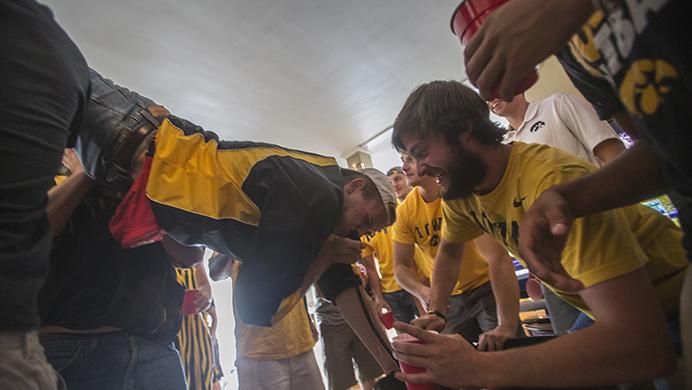Greek-life leaders at the University of Iowa have tightened rules for events with alcohol and created strict penalties for chapters that violate these new terms.
In a letter sent to the greek community on Aug. 4, officials said the temporary ban on events with alcohol — originally established in May — will continue into the fall semester. Under this ban, sororities and fraternities in the Panhellenic Council and Interfraternity Council cannot have alcohol at any chapter events. Sanctions for violating the ban have been established in the memo as well.
The ban is a product of a Fraternity and Sorority Life Alcohol Task Force established earlier this summer, which is a group of student greek leaders and other officials involved in student life on campus. Presidents of both the Panhellenic and Interfraternity Councils are on the committee.
Alcohol Task Force Update Memo – August 4 2017
The ban went into effect days after the death of Kamil Jackowski, a UI student who died at Sigma Chi’s spring formal at Lake of the Ozarks, Missouri. The ban addresses the “pervasive and dangerous alcohol culture that exists within our community,” a May statement issued to the UI and interfraternal communities said.
Violations lead to strict sanctions
The penalties for violating the ban are different for fraternities and sororities.
On the first offense, a fraternity will not be allowed to participate in formal recruitment and will be on social probation for at least six months after the end of the ban.
On the second offense, the fraternity’s chapter status will be reviewed for potential suspension or loss of recognition.
The penalties are similar for sororities, with first offense resulting in a six-month probation starting after the end of the ban, and second offense leading to review for potential suspension or loss of recognition.
The policies on what constitute an event vary by individual chapter, UI Associate Director for Student Organizations & Leadership Programs Anita Cory said, and many of these policies use the term “reasonable observer.”
“If I saw you and three friends out to dinner wearing sorority letters, I probably wouldn’t think that’s a sorority event,” Cory said. “But if there were 50 of you somewhere, even if you weren’t wearing letters, a reasonable observer would say, ‘Well, that must be a sorority event.’ ”
“We call it the duck test also. If it looks like a duck, walks like a duck, then it’s probably a duck. And if you have to ask, ‘I wonder if this is a duck,’ then it probably is.”
This summer, the letter said, a Fraternity and Sorority Life Alcohol Task Force convened to find solutions to the culture of alcohol in greek communities. The letter ensures that the task force is invested in “keeping the safety of all our current and future members as our first priority.”
“The status quo is no longer acceptable, nor are we aligned with the values fraternity and sorority founders articulated when each of our organizations began,” the letter says.
Ban should end this semester
The ban is temporary, but greek-life leaders do not yet know when it will end. In a May 1 letter to the presidents of the Panhellenic and the Interfraternity Councils, former Vice President for Student Life Tom Rocklin said he expects the leaders to “maintain the moratorium on events involving alcohol until the task force has made substantial progress.”
Cory said the definition of “substantial progress” includes completing a first round of recommendations for the community and developing a checklist of best practices to guide chapters in planning safe events.
The current Vice President for Student Life, Melissa Shivers, is scheduled to meet with student leaders and offer feedback on the task force, Cory said. Shivers began her role on June 30.
Although there is no set release on the ban, Cory said she expects the ban will be lifted soon.
“It’s not like it will take all semester, but it might take another couple weeks,” she said.
Tailgate rules still up in the air
In regard to tailgate events — which Cory said have been related to reports of over-consumption for students — the task force is working on recommendations to make the events safer.
“That’s a really tricky one that I know the task force struggled with, but if you go back to my definition of the duck test or the reasonable observer, those are probably pretty clearly greek events [and can be reason for a violation of the ban],” Cory said.
Anna Long, president of the Panhellenic Council, declined to answer questions from The Daily Iowan, but provided an emailed statement regarding the ban.
“I maintain the position that students need to be active stakeholders in the process to create a plan to address alcohol culture and safe environments in the greek community,” Long said in the email. “Now that students are back on campus, we are eager to reengage them in a collaborative process that includes all perspectives in the final recommendations the task force will bring forward.”
The students involved, Cory said, have driven the push for change, and she applauded those students for stepping up to govern themselves and their peers.



